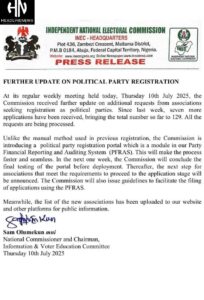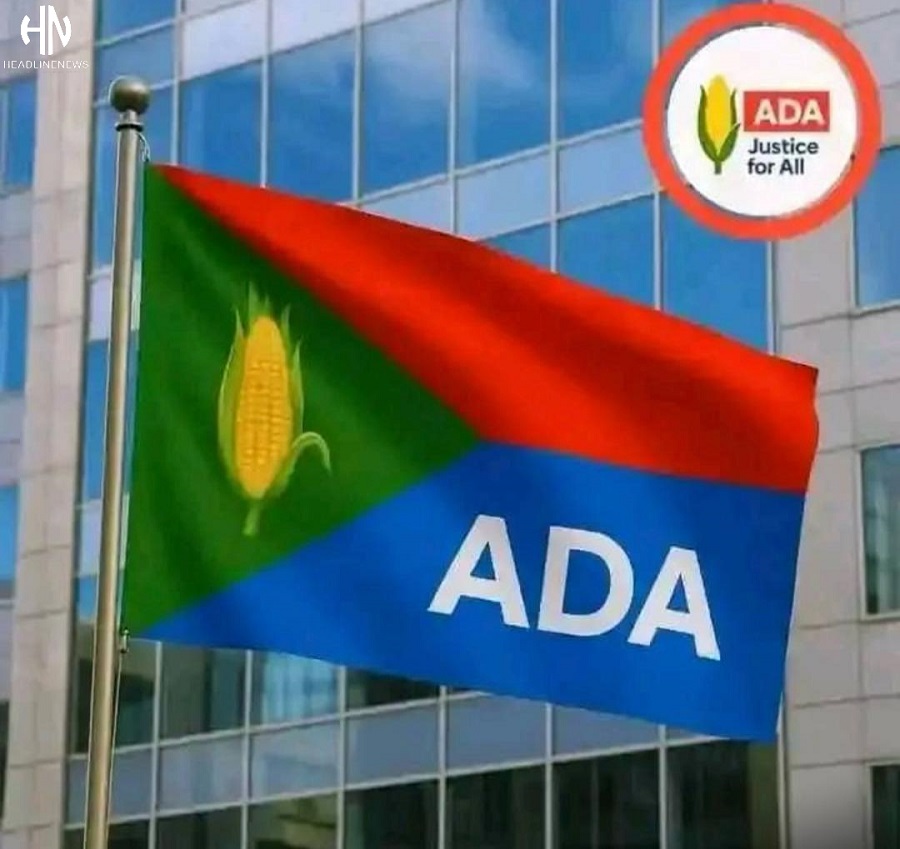HEADLINENEWS.NEWS REPORT
Sunday, July 13, 2025
ADA Seeks Party Registration as Opposition Fragments Further Amid Strategic Disagreements
“The multiplication of opposition parties often signals division, not strength.”
— Prof. Mahmud Jega
(Political Analyst, Bayero University)
By The National Patriots, HeadlineNews Political Bureau
As Nigeria’s political opposition continues to splinter, the African Democratic Alliance (ADA) is pursuing formal registration with the Independent National Electoral Commission (INEC), raising fresh questions about the strategic wisdom of creating new political vehicles versus consolidating existing platforms.
The New Party Phenomenon: Promise or Distraction?
INEC’s responsiveness to ADA’s registration application, while demonstrating institutional efficiency, also highlights a growing trend in Nigerian politics—the preference for creating new parties rather than reforming existing ones. Political observers note this pattern often reflects deeper challenges within opposition movements.
The National Coalition Committee’s approval for ADA’s registration comes amid ongoing debates about whether Nigeria’s democracy benefits from party proliferation or suffers from it.
“Every new party represents both hope and fragmentation. The question is whether the hope outweighs the division,” noted Dr. Remi Sonaiya, former presidential candidate.

ADC’s Challenges: A Case Study in Opposition Limitations
The African Democratic Congress exemplifies the complex challenges facing opposition parties in Nigeria’s political landscape. Sources familiar with party operations identify persistent issues that may have prompted some members to seek alternatives:
- Legal Uncertainties: Recent court challenges surrounding ADC’s activities have created operational constraints, though such legal disputes are common in Nigeria’s litigious political environment.
- Leadership Dynamics: The party’s structure, heavily influenced by presidential aspirants, reflects a broader pattern in Nigerian politics where individual ambitions often overshadow institutional development.

Strategic Analysis: New Parties vs Existing Platforms
The emergence of ADA raises fundamental questions about opposition strategy in Nigeria’s democratic system:
Advantages of New Party Formation:
- Clean Slate: Freedom from existing internal conflicts and baggage
- Fresh Branding: Opportunity to attract disillusioned voters seeking change
- Unified Vision: Potential for cohesive leadership without inherited divisions
- Grassroots Appeal: Ability to build from the ground up with local relevance
Disadvantages of Starting Fresh:
- Resource Intensive: Enormous costs for nationwide infrastructure development
- Recognition Deficit: Lack of brand familiarity among voters
- Institutional Weakness: Absence of established party machinery and experience
- Electoral Mathematics: Historical data shows new parties rarely achieve breakthrough success
Benefits of Using Existing Platforms:
- Infrastructure Ready: Established party structures across all states
- Voter Recognition: Existing brand awareness and ballot familiarity
- Resource Efficiency: Lower costs for institutional development
- Electoral Viability: Proven capacity to contest elections nationwide
Drawbacks of Existing Platforms:
- Inherited Conflicts: Pre-existing internal disputes and factional loyalties
- Limited Reform Space: Resistance to fundamental changes in party culture
- Leadership Constraints: Difficulty displacing entrenched power structures
- Credibility Questions: Association with past failures or controversies

The Mathematics of Opposition Politics
Political analysts suggest that the proliferation of opposition parties may inadvertently strengthen the ruling All Progressives Congress (APC) by diluting anti-incumbent votes across multiple platforms.
“When opposition forces multiply, their collective impact often diminishes. This is basic electoral arithmetic,” observed Prof. Adele Jinadu of the Nigerian Institute of Advanced Legal Studies.
Historical evidence supports this concern. The 2023 general elections demonstrated how vote splitting among opposition parties can benefit the incumbent, even with reduced vote shares.
ADA’s Strategic Dilemma
As ADA pursues registration, party organizers face the fundamental challenge that has confronted every new political movement in Nigeria: how to build sustainable institutions while competing against established parties with superior resources and recognition.
The party’s positioning as an alternative to both APC and traditional opposition parties like PDP and ADC requires carefully navigating complex voter loyalties and regional dynamics.

Implications for 2027 Electoral Calculations
The emergence of additional parties like ADA complicates electoral mathematics for all stakeholders. While this may provide more choices for voters, it also raises questions about opposition effectiveness in challenging incumbent power.
Political strategists note that successful democracies often feature strong opposition parties that can realistically compete for power, rather than numerous smaller parties that fragment anti-government sentiment.
“Democracy requires strong alternatives, not numerous alternatives,” said Dr. John Ayoade, Professor Emeritus of Political Science at the University of Ibadan.
The Sustainability Question
Perhaps the most critical challenge facing ADA—and similar new parties—is long-term sustainability. Nigerian political history is littered with parties that emerged with great fanfare only to fade when faced with the realities of electoral competition and institutional building.
The true test for ADA will not be registration success, but demonstrating the capacity to build lasting democratic institutions that can survive electoral defeats and leadership transitions.

COMMENTARY
“The Opposition’s Multiplication Problem”
Excerpt: While party proliferation appears to strengthen democracy, it often weakens opposition effectiveness by dividing limited resources and voter attention across too many platforms.
Comment: ADA’s emergence reflects opposition frustration, but may paradoxically serve incumbent interests by further fragmenting anti-government sentiment.
Quote:
“In politics, addition through division rarely equals victory.”
— Dr. Segun Osoba, Former Ogun State Governor
“New Parties, Old Challenges”
Excerpt: The enthusiasm for creating new political parties often overlooks the institutional requirements for sustainable democratic competition. Building parties is harder than registering them.
Comment: ADA faces the same fundamental challenges that have limited other new parties: resources, recognition, and realistic electoral pathways.
Quote:
“The graveyard of Nigerian politics is filled with parties that confused registration with relevance.”
— Prof. Eghosa Osaghae, Nigerian Institute of Advanced Legal Studies
“Strategic Wisdom vs Political Emotion”
Excerpt: The decision between building new parties and reforming existing ones often reflects emotion over strategy. Opposition effectiveness requires cold political calculation, not idealistic party creation.
Comment: Nigeria’s opposition may benefit more from consolidation than multiplication, regardless of internal frustrations with existing platforms.
Quote:
“Sometimes the hardest political work is reforming what exists rather than creating what’s new.”
— Olusegun Obasanjo
For continued analysis of Nigeria’s evolving political dynamics, follow HeadlineNews.news




